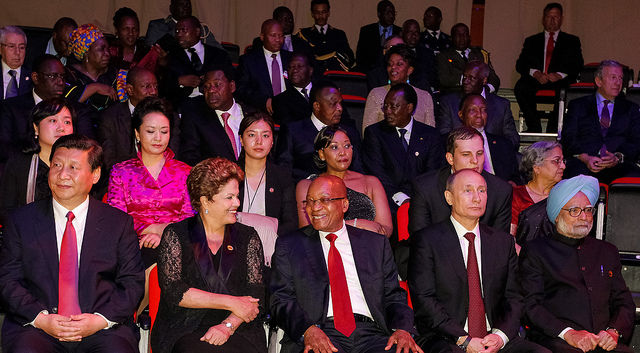Why ‘None of the Above’ is the starting point for electoral reform and should be the priority of all political and electoral reformers at this time
Richard Berry recently responded on Democratic Audit to NOTA UK member Rohin Vadera’s article “Democracy demands that a ‘None of the Above’ option be added to ballot papers for UK elections” with an article which suggested alternative reforms to UK voting arrangements. Here, the founder of NOTA UK, Jamie Stanley, responds, finding fault with Berry’s critique.

Russian President Vladimir Putin, and former Indian Prime Minister Manmohan Singh (bottom right), both countries which use NOTA (Credit: Blog do Planalto, CC BY NC SA 2.0)
I welcome Richard Berry’s contribution to the debate on the merits of adding a None of the Above option to ballot papers for UK elections, and with it the opportunity to clarify a few things. Richard misses the point of the NOTA campaign on a number of levels. I will deal with each in order of importance.
The India Model
Richard begins his dismissal of NOTA with a clear logical fallacy. He acknowledges that the NOTA mechanism used in India is ‘faux-NOTA’ or ‘NOTA-lite’, a kind of token gesture with no formalised consequences for the result if the majority choose it. He then cites the fact that only a small % of voters made use of it at the last election to imply that NOTA would make no discernible difference if added to UK ballot papers. But this omits the obvious fact that an absence of formalised consequences renders the Indian version of NOTA meaningless and in doing so offers no more incentive for disillusioned voters to take part than if it were not there at all. The difference between a NOTA option with formalised consequences for the result and ‘faux-NOTA’ cannot be emphasised enough. Yet this is downplayed as a dubious way of discrediting NOTA outright.
Claims Unsupported by Evidence
These are numerous. The author states: “the notion that significant numbers of voters refuse to participate at the moment because they lack a formal mechanism for registering discontent is far-fetched.”
No explanation for this is offered. He then compounds this assumption further by playing the class card and suggesting that people on lower incomes are not intellectually equipped to engage thoughtfully at election time: “simply being in a position to choose it (NOTA) requires a level of political engagement that is unthinkable for millions of citizens” Apparently, for such people: “attending a polling station to vote for ‘none of the above’ is in almost every respect the very same activity as attending a polling station to vote for a party.”
The inference here is that apathy and ignorance are the main drivers of voter abstinence, as if it has nothing to do with antipathy and the view held by large swathes of the population that they have no representation in parliament. Voting NOTA is, by definition, the exact opposite activity of voting for a party. It is the act of formally withholding consent and rejecting all parties and candidates on offer for reasons of conscience, and, by extension, demanding better choices. The notion that non-voters – predominantly people on lower incomes, according to Richard – would not be able to discern this for themselves is beyond patronising.
Achievable Reform
The crux of Richard’s article is the suggestion that his three proposed reforms would be more effective than NOTA and that the latter is therefore not worth bothering with in the first place. But this could not be further from the truth.
The three reforms he describes are desirable ones, but they are not essential or central to the concept of democracy itself. As such, they can be (and routinely are) paid lip service to and roundly ignored by the UK’s political establishment. The current system works just fine for them, so why would they change it unless they absolutely had to?
By contrast, NOTA represents a democratic prerequisite: the ability to formally withhold consent at an election (consent being a central pillar of democracy, only truly measurable if it is possible to withhold consent). For this reason, once properly understood and once firmly embedded in the collective consciousness, NOTA would become an achievable reform, an inevitable future government concession. Why? Because to argue against a democratic prerequisite is to argue against democracy itself, something no member of the UK political establishment can ever be seen to be doing (even if they are anti-democratic in practice).
This is what sets NOTA apart from all other desirable reforms. The fact that it would be achievable in the short to mid term, with enough understanding of and support for it, is precisely the reason why it should be the ground zero of electoral reform for all those seeking to modernise and improve our democracy at this time.
All in all, Richard’s article is an attempt to discredit an idea whose time has come founded on baseless assumption and logical fallacy. For those wishing to find out more about our campaign, a good starting point is NOTA UK’s video series ‘NOTA Explained‘.
—
Note: this post represents the views of the author, and not those of Democratic Audit or the LSE. Please read our comments policy before posting.
—
 Jamie Stanley is a professional recording artist, music producer and founder of NOTA UK, campaigning since 2010 for an official ‘None of the Above’ option to be included on ballot papers for all future UK elections. His personal website can be found here.
Jamie Stanley is a professional recording artist, music producer and founder of NOTA UK, campaigning since 2010 for an official ‘None of the Above’ option to be included on ballot papers for all future UK elections. His personal website can be found here.





 Democratic Audit's core funding is provided by the Joseph Rowntree Charitable Trust. Additional funding is provided by the London School of Economics.
Democratic Audit's core funding is provided by the Joseph Rowntree Charitable Trust. Additional funding is provided by the London School of Economics.
[…] a good idea, and would it make any real difference? Democratic Audit has carried pieces from firm advocates and sceptics of the proposal. Here, Emma Rome (an advocate of the reform), and Richard Berry debate […]
[…] although of no real significance to our ongoing campaign, certainly warrants a response from me “in my own way” for reasons that will hopefully become […]
[…] proposals put to the survey, the most popular is perhaps a surprising one: the inclusion of a ‘None of the Above’ option on the ballot paper, with over 70% of respondents in favour. A controversial measure, it […]
[…] There’s been some discussion on the Democratic Audit website about NOTA. Mr Berry recently wrote about election reform, claiming that PR, election primaries, and a lower financial burden on candidates would be better ways to make our government democratic, rather than NOTA. Mr Stanley has responded in his own way. […]
[…] and would not give UKIP voters the representation they are forecast to earn this May. If you visit https://www.democraticaudit.com/?p=10733#comment-59132 you can see some debate about this and join in if you […]
Should having voting option #NOTA be the starting point ? @richard3berry https://t.co/Gm6ZMqesm8 @BiteTheBallot #NVRD
NOTA is like giving aspirin to a Cancer patient.
Although I welcome debate on the UK voting system, the system is totally rotten and needs radical surgery.
I live in a very a safe Constituency. The Conservative candidate will win even if I vote against him. The other candidates will all lose even if I vote for one of them. About seven out of ten constituencies are safe for one party or the other.
One or more of the candidates may be quite acceptable so NOTA would not help in this situation.
Liberal Democrat voters are under-represented in the present Parliament and UKIP voters may be under-represented in the next Parliament. Whatever one thinks of those parties, that is bad for democracy and NOTA would not help.
The surgery needed is a new voting system that abolishes safe seats and gives fair representation to voters. I recommend readers to visit http://www.stvAction.org.uk for more information on a system that would achieve that.
[…] “Why NOTA is the Ground Zero of Electoral Reform” […]
Why ‘None of the Above’ is the starting point for electoral reform & should be a priority of all political reformers https://t.co/0V5Vz3w5Qm
Making the case for None Of The Above in electoral reform. https://t.co/3cXPBpsHSs
Why ‘None of the Above’ is the starting point for electoral reform and should be the priority… https://t.co/WsjKJx0U41 https://t.co/5dDhaFZM4T
Why ‘None of the Above’ is the starting point for electoral reform https://t.co/LPHMcHUIp6
I believe there’s some evidence of people voting ‘randomly’ by checking the first box on the ballot paper – which is why there’s some concern about ballot ordering. In light of this, I would suggest that, rather than having None Of The Above at the bottom of the ballot paper, we have None Of The Below at the top. Anyone who checks the first box, without any consideration as to what it’s for, can hardly be taken to have expressed their support for a particular party.
Our response to a recent anti-NOTA article, published on Democracy Audit: https://t.co/zxVr2xUz9A @JolyonRubs @JeremyPaxman @OccupyLondon
Our response to a recent anti-NOTA article, published on Democracy Audit: https://t.co/zxVr2xUz9A @paulmasonnews @stephenfry @stacyherbert
Our response to a recent anti-NOTA article, published on Democracy Audit: https://t.co/zxVr2xUz9A @tom_watson @electoralreform @UKuncut
Our response to a recent anti-NOTA article, published on Democracy Audit: https://t.co/zxVr2xUz9A @SkyNews @Aiannucci @bbcquestiontime
Our response to a recent anti-NOTA article, published on Democracy Audit: https://t.co/zxVr2xUz9A @GdnPolitics @38_degrees @chunkymark
Our response to a recent anti-NOTA article, published on Democracy Audit: https://t.co/zxVr2xUz9A @jonsnowC4 @krishgm @IndyPolitics
Our response to a recent anti-NOTA article, published on Democracy Audit: https://t.co/zxVr2xUz9A @wiganshale @OwenJones84 @MarkCatlin4
Our response to a recent anti-NOTA article, published on Democracy Audit: https://t.co/zxVr2xUz9A @rustyrockets @Leigh_Pickett @Scriptonite
Why ‘None of the Above’ is the starting point for electoral reform and should be the priority of all political and… https://t.co/uuN15wyJh3